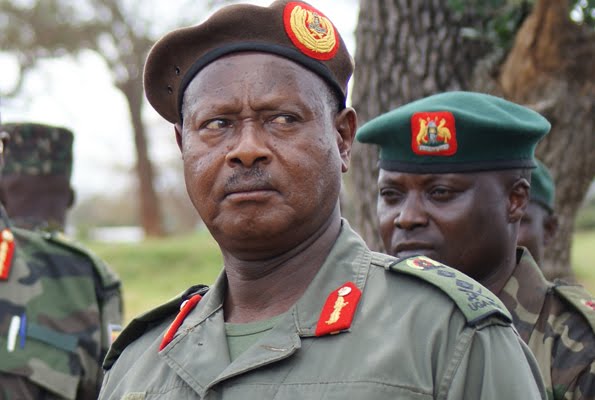The National Resistance Movement (NRM)
"No
one should think that what is happening today is a mere change of
guards: it is a fundamental change in the politics of our country"._
Y.K Museveni (1986

NRM government came to power after its victory over the military junta.
Yoweri Museveni at the age of 42 was sworn in as Uganda's eighth
President on 29th January 1986. He assured Ugandans that his take over
was not "a mere change of guards but fundamental change" in the
politics of the country.

Museveni was born in 1944 in Kyamate among the Banyankole -Bahima nomads of Southwestern Uganda to Amos Kaguta and Estheri Kokundeka. Museveni became politically active since his student days, studied political science at the University of Dar-es-Salaam, graduating in 1970 with a Bachelor of Arts. He worked in Obote's office as a secretary for research.
After Amin's coup in 1971, Museveni with his Front for National
Salvation worked together with Obote's Kikos Malum and the Tanzanian
Peoples Defence Forces, which ousted Amin in April 1979. In governments
that succeeded Amin, Museveni served briefly as Minister of defence,
Regional co-operation and vice chairman of the Military Commission.
Contested for Presidency through his UPM party but lost miserably to Obote. On Feb.6.1981, Museveni went to the bush, and with 26 other young men organised the NRA to oppose the dictatorship that Obote's regime had unleashed upon the people. He came to power in 1986 and has become Uganda's longest ruling president since independence.
Contested for Presidency through his UPM party but lost miserably to Obote. On Feb.6.1981, Museveni went to the bush, and with 26 other young men organised the NRA to oppose the dictatorship that Obote's regime had unleashed upon the people. He came to power in 1986 and has become Uganda's longest ruling president since independence.
When he came to power, Museveni condemned the acts of the former
leaders, which were based on sectarianism backed by illiterate armies
rooted in the colonial era.
The NRM inherited a collapsed economy, decayed infrastructure with institutions of law and order in disarray, a disheartened civil service, a disillusioned population and a decline of moral standards.
The NRM inherited a collapsed economy, decayed infrastructure with institutions of law and order in disarray, a disheartened civil service, a disillusioned population and a decline of moral standards.
The NRM leadership set out to establish a broad based system of
governance without involving parties. The NRM system of governance is
based on individual merit. It is a system, which embraces all citizens
of a country. It is meant to be a short term but its survival depended
so much on the referendum. Its leadership is based on the ten-point
programme.
Immediately the NRM government came to power, all political party
activities were suspended. A constitution commission was appointed,
headed by Justice Odoki to make a new constitution for Uganda. The
commission gathered views from Ugandans that finally made the daft
constitution. The people through universal adult suffrage elected the
Constitution assembly to debate and enact the constitution. This was
successfully made in 1995.

ABOVE: Some of the Generals who fought in the bush still working hard to maintain peace in the country.

ABOVE: Some of the Generals who fought in the bush still working hard to maintain peace in the country.
The referendum was held in June 2000 but was largely boycotted by multi
partists and other members of the opposition. The results showed that
the movement was still very popular especially among the peasants and
upcountry folks.
Elections at local council level, parliamentary and presidential have
been held regularly since in 1989. This is a sign of participatory
democracy, which Ugandans wanted. However, the conditions only favour
movement candidates in all aspects.
National Movements and New States in Africa